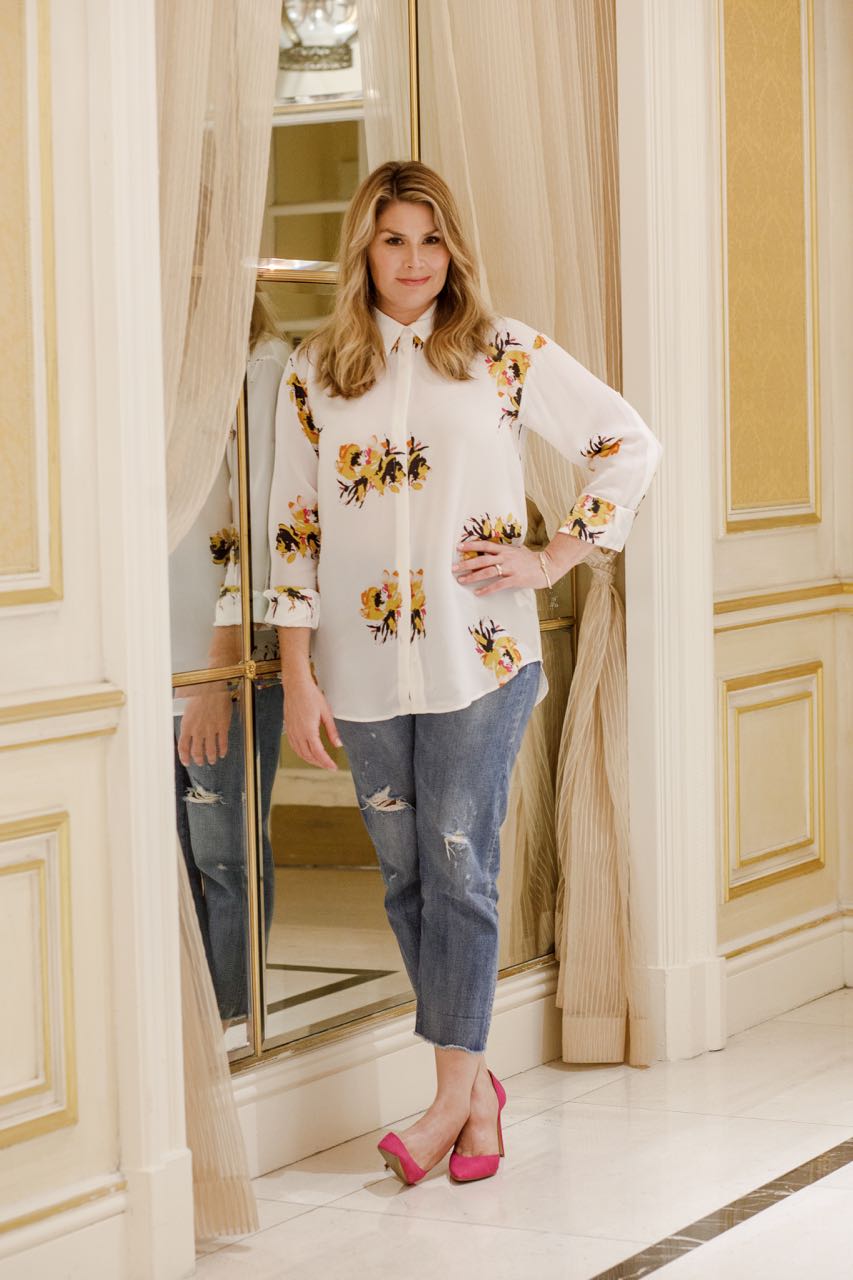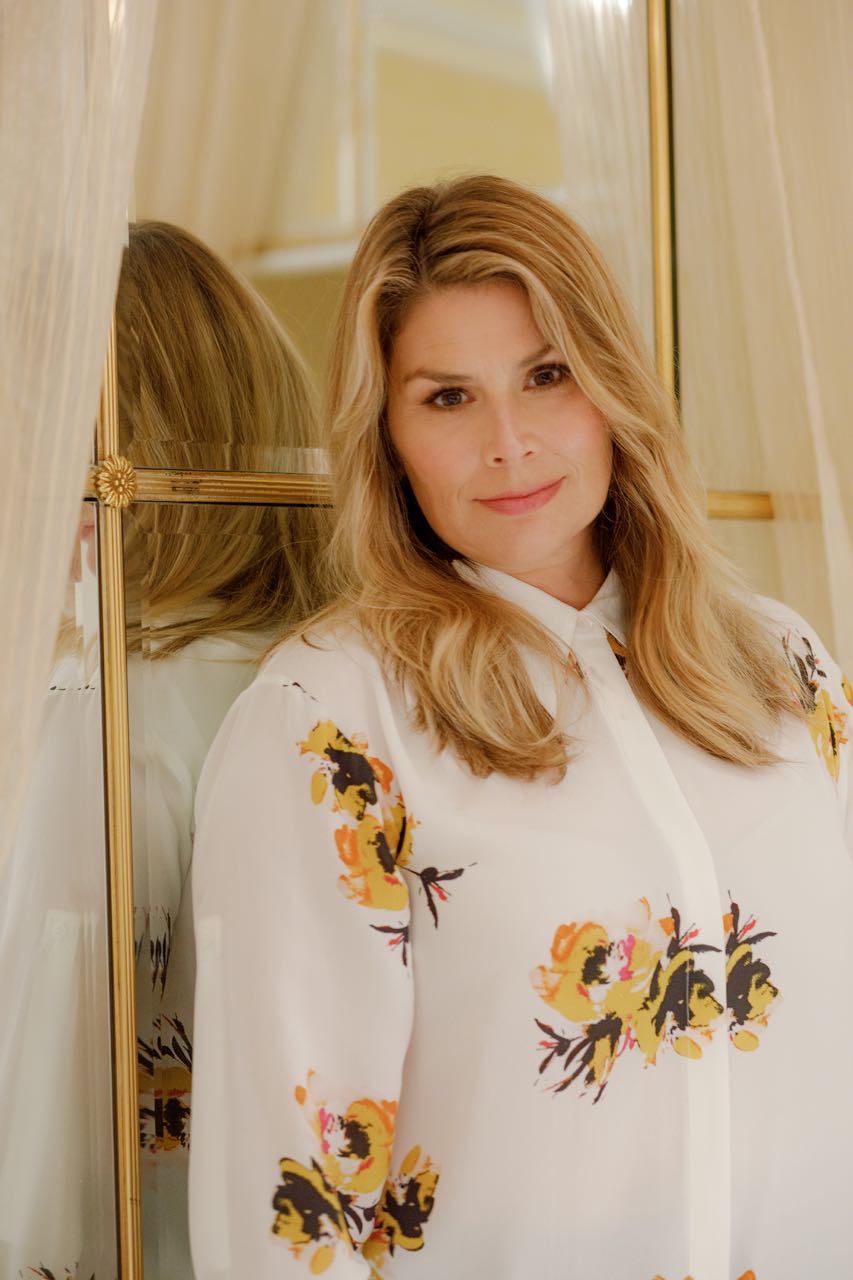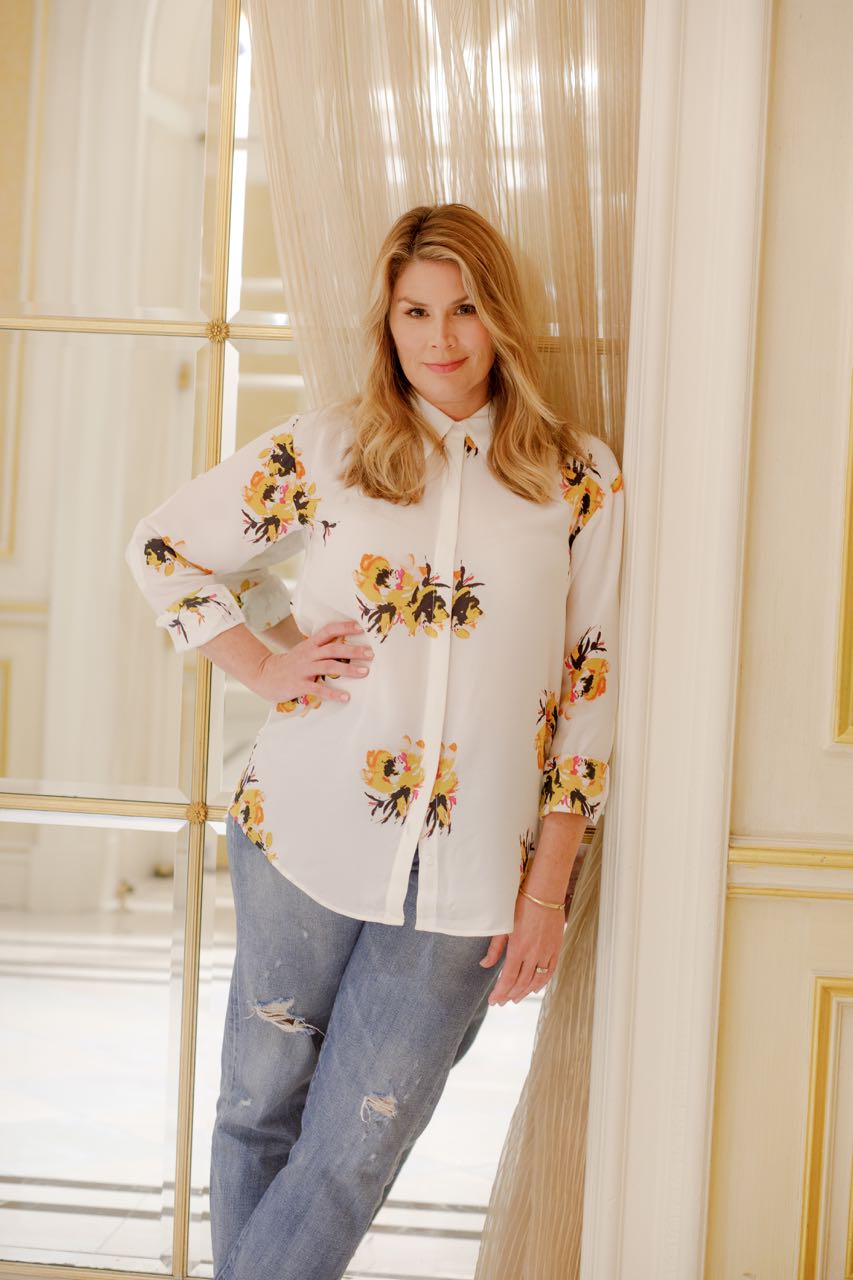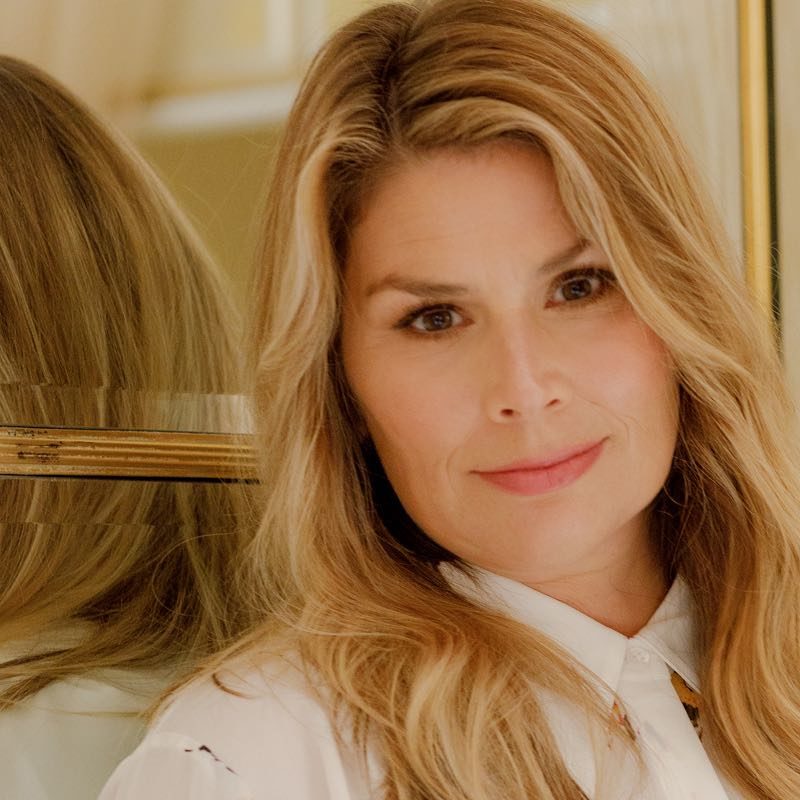An Interview with Heidi Blickenstaff

Written by Victoria Myers
Photography by Jacqueline Harriet
August 7th, 2018
Way back in the fall of 2008, when Obama was about to be elected President and there was only one Sex and the City movie, among a certain type of theatre fan, one of the most popular and special shows on Broadway was a four person musical where the actors all played characters with their own names, called [title of show]. With its blend of fourth wall-breaking meta-realism and open-hearted sincerity, for that certain type of theatre fan, especially ones of a certain age, [title of show] felt like discovering something brand new that had been created just for them and that they, along with the others that crowded the stage door, had a hand somehow in bringing to life.
One of the actors at the center of that was Heidi Blickenstaff. At the time, I interviewed Heidi for a now-defunct website I started with friends, The 8th Avenue Observer. In the introduction, I wrote about how everyone was always professing their desire to have her as their best friend and how much they loved her, complete with a reference to the also now-defunct AIM. We spoke about what it was like to be at the center of that experience, and her own struggles to find herself as a young person. Plus, the latest rumor about Jennifer Aniston’s personal life (because some things are fated to last an eternity whether we want them to or not).
Ten years later, Heidi now finds herself in another rare position: after doing the stage musical of Disney’s Freaky Friday at Signature Theatre in Arlington, VA, she was hired to reprise her role in the made-for-TV movie, which premieres on August 10th. Freaky Friday is a mother-daughter story, but also one that touches on the idea of what it means to be in the body of a girl and what it means to be in the body of a woman? What do you lose and what do you gain? I recently spoke with Heidi about her journey with the film, being brave on camera, aging, and more.
You did the musical of Freaky Friday, and then you did the movie, which doesn’t happen very often.
Hardly ever.
Take me through the process for how it went from one to the other.
Disney Theatricals has been building Freaky Friday for a number of years. I actually was a part of the very first reading when Mary Rodgers was still alive, and this was like 5-6 years ago now. Disney Theatricals was trying to figure out how they wanted to tell this story and they kept going back to the drawing board. Eventually, Bridget Carpenter, our brilliant book writer, and Tom Kitt and Brian Yorkey, our amazing Pulitzer Prize-winning composer-lyricist team, wrote this gorgeous show. And about a year and a half ago, I was the lucky girl who got to do the very first production of it. We did what Disney Theatricals was calling a Pilot Production. They weren’t exactly sure what they wanted to do with it but they knew they wanted to do it in front of an audience and keep working it out. That happens to a lot of Broadway shows these days. They have out of town try-outs, they change things, they cut roles, they add actors, whatever.
We were doing that out on the road and we had a couple of stops including the Signature Theatre in Arlington, and then we went to the La Jolla Playhouse. And once we were at La Jolla, that’s when Disney Channel came down to see us. We didn’t know what they knew, which was they were interested in turning Freaky Friday, the musical, into a DCOM [Disney Channel Original Movie]. And at that point, I didn’t even know what a DCOM was. So a couple of weeks went by, we were still at La Jolla, and we found out that Disney Channel, indeed, was green-lighting a project to make Freaky Friday into a TV musical and that was exactly the moment when I was absolutely positive I would no longer be playing my part. Because it just never happens that the theatrical originator gets to also make the movie. And I thought, surely, that would be a famous television or film actress who would be lucky to play this great part. It’s such a huge, wonderful challenge, and I know there would be lots of actresses who would chomp at the bit to play it. So I kissed it goodbye.
Then, as the months went by, Disney Channel kept bringing me in to test with different actresses who were potentially playing Ellie, and to test with Alex Desert, who ended up playing my fiancé in the movie. I still was thinking, “I think I’m just doing them a favor. Because this famous actor, whomever she is, she doesn’t come in and test with people. She’s just going to be a straight offer.” And so I really did think that this was just the theatre actress doing a favor. Then miraculously, after Cozi [Zuehlsdorff] and I had a final test together, about three weeks later I got the call that I got the job. I truly was gobsmacked. Thinking about it now, I get emotional about it because as a devoted theatre actress, I let that part go, and if I get a special guest star on Law & Order that’s like, “I did it, I’m on TV!” But to be starring in a Disney Channel Original Movie is a dream I didn’t even know could be possible.
Months later, I was whisked away to Vancouver and we did a month of pre-production. Cozi and I got to know each other, because Cozi was new to the project, she did not do the theatrical version—that was another brilliant theatrical actress named Emma Hunton. Cozi and I stole everything from each other, and learned each other’s mannerisms, and then we began filming. I had to adjust my acting style for the camera, which I had never, ever, ever, ever done before. Thank God I had such great support around me, because people wanted me to still be me, I just kind of needed to tune the acting in a different way so that it wasn’t insane on film.
How was the process of adjusting your performance? We always hear that stage is big and screen actors need to be smaller. How was that for you? And going back to the audition process and not thinking it was real, do you feel like that actually helped you in not second guessing yourself?
I tip my hat to Steve Carr, our director. Steve and I got along immediately, and I don’t know what it was, but we have a very similar sense of humor. I think at first he was like, “Oh boy, what’s the theatre actress going to do?” He had never worked with a theatre actress in this capacity before. Obviously I didn’t know what I was doing, and so we sort of cleaned the slate and we basically felt like we’re starting from scratch; we’re building this together. We built a vocabulary and a safety between the two of us so that he could tell me when something wasn’t quite right. It’s not just a matter of you act big for stage, and you act small for film—it’s not that simple. It’s much more calibrated than that, it’s nuanced. And there are some things in the movie that are really big. You’re going to see me pull at my face like Jim Carrey. I do things that are definitely big physical comedy moments. But because it’s a different medium, it just has to be thought of in a different way. And Steve was really great at doing it, helping me to have the confidence to do that. Telling me when things were a little out of shape.
The crazy thing was—which I never in a million years thought that I would be liberated enough to do—he basically made it safe for me to improvise. As an actor in a musical on Broadway, you don’t improvise unless you’re doing a specific improvised kind of show. You can’t, because the lighting designer is relying on you to say the line in the same place every night when the light comes up. So you have to do it the same every night. But when you’re doing it for film, you’ve got another take if you mess it up, and if you get in a groove where jokes are starting to roll out, Steve would be like, “Where you are right now, stay there, be brave, go for it, think along the lines of this kind of a joke,” and he would set me free. I am such a huge admirer of Kristen Wiig, Tina Fey, Maya Rudolph, I love those women so much. They’re brilliant writers, brilliant comedians, brilliant actresses who aren’t just great at being funny, but also have this tremendous depth as dramatic actresses too. I felt like somehow Steve helped me tap in to feeling safe enough to just go for it.
In the finished product of the movie, like 40% of my dialogue is improvised. And that’s not to disrespect Bridget Carpenter, our screenwriter, because she is a brilliant screenwriter and thank God for her writing the beautiful script that she did. But I think the combination of the ink that Bridget wrote and the freedom I was given to improvise around it was the greatest gift. And I learned so much.
In Freaky Friday, the mother and daughter switch bodies, so you end up playing a teenager in the body of an adult woman. There are a lot of issues surrounding women and age in our culture. Was that something you thought about? And how you physicalize age?
I’m in my 40s and I love the confidence that I have as an older person, as a woman getting older, and I really do feel like I know myself better than I ever have. I feel confident in the decisions I make. But the body decaying part sucks. And it’s not fair, because I feel like I’m nailing it in so many aspects of my life, except my back hurts all the time. And I wake up and I have to climb out of bed slowly so my ankle doesn’t buckle. It’s totally not fair, especially because I started out as a dancer when I was a kid and I danced for way too many years, way too hard, and so now I’m paying for it. But what I found to serve me the best when I was making this movie was to not be afraid to be ugly. Jennifer Coolidge said in an article, “You really have to check your ego at the door if you want to go for it.” I heard that loud and clear when I read that, and I felt like if this is going to work I have to really think about what it would be like if a 16 year old punk kid was suddenly inside this body that is wrinkled, slightly sagging, sore, has age spots that are showing up in places that I made fun of my nana for. I thought that would be shocking, if you came from this agile, flexible, taking it for granted young body. I decided to really, really go for it, and not be afraid to highlight the things that I look in the mirror and I’m like “Really?” like “Crows feet? Really? My concealer is caking under my eyes?” And instead of protecting myself, I decided as Ellie to humiliate myself, and to really commit to it. Hopefully that’s going to pay off and make people laugh.
Is it also scary as an actress, since the entertainment industry is what it is?
Of course. And especially being a theatre actress, rolling into the film medium. I think in New York City there is more than acceptance that you don’t have to be a size zero; you don’t have to have augmented your body in any particular way. Theatre people are a little further away from you, so even though I’m in my 40s, the last musical I did on Broadway my character was in her 30s and pregnant. There’s a little more suspension of disbelief because of that distance.
I have insecurities like everybody does, for sure, and I see the aging process. But instead of pretending like it’s not happening, or protecting myself from really going there, I decided to dive in. Because I also think we need more images of normal women in TV and film. And I am a normal woman who has back fat and things about me that drive me nuts, but I want to see more images of that. I want to see more women who look like real women. I wanted to be one of the images that I would want to see, and not afraid to share the aging and imperfections. I think that’s part of being human, and I think it’s beautiful too.

About 10 years ago I interviewed you during [title of show]. We talked about how when you were in your late teens/early 20s you went through some insecurities, and dealing with that at the same time as entering the entertainment industry. I ask actresses all the time about what their process was for figuring out who they are as people, who they are as artists, while also being in an industry that’s so into typecasting and telling you who you are. I was wondering if you could talk a little bit about what your process was like for that and how you figured that out for yourself?
It did not come overnight, and I think I spent the beginning part of my theatrical career trying to fit into someone else’s mold. I looked at Alice Ripley and Idina Menzel, and those wonderful actresses that came before me, and I thought I needed to be like them. It wasn’t really until [title of show] happened, and I was in my early to mid-30s when that happened, that something clicked for me, and I realized that no one is ever going to be better at being me than me. And so, if I’m really busy trying to be Emily Skinner or somebody else that I admired at that time, I’m missing the whole point, because Emily is already Emily, and no one’s doing it better than Emily. And I’m going to rock hard as me. So once I kind of absorbed that idea, I was like, “Okay, and that means that I’m going to show up as myself.” So when I went to auditions I stopped wearing the perfect audition dress, and the perfect character heel, and the tan tights, and I went in jeans and boots, and a T-shirt, and a blazer. Instead of singing something perfect for the musical I was going in for, I sang a song that I loved, where I felt like this is going to make me comfortable, and, at the very least, this is going to show them who I am. Then if they want to hear me sing “If I Were a Bell” because I’m auditioning for Guys and Dolls, I’ll learn that. But first I’m going to sing a rocked out weird version of “Delta Dawn.” And that started working for me, and the more I did it, the more it worked. Then [title of show] happened, which was the best calling card because even though it was basically a commercial flop, it was a critical success. And it was such a great calling card because I played myself. So people in the industry were like, “That girl, she’s a weirdo, but look at all that she did.” Everything changed after that, and that’s what every actor dreams of at that moment where you are seen. When we did [title of show], we played ourselves. I didn’t invent a character, it was me. So it really clicked for me that sticking with me and all of my imperfections, and all of my… I don’t know, just my me-ness, was the key.
Thinking back again to ten years ago when all that was happening, what’s something that you wish you knew about this career at that point? Not necessarily back at 22 years old, but once you were actually in it and having success, what do you feel like would have been helpful?
I think what I know now that I didn’t know then was that I have to have balance. I think when I was younger I was like go, go, go, go, go, and the miles I covered going from audition to audition, to dance class, to rehearsal, to wherever. Not that that didn’t pay off, it did, but for me now—and maybe it’s a function of getting older, but I really do have to have balance in my life. Which means I love nothing more than my family, my husband, my stepsons, my dog, my time outside, my time at Costco—I’m not kidding—it’s the normal parts of life, balanced with this insane life that I also live. That keeps me incredibly grounded. That’s the real part of my life. And I also can do this other thing that I’m so grateful for, and I’m utterly grateful that I’m having this opportunity right now that is sparkly and exciting, but my real, real life is my family.
I think when I was younger, I was so worried that I was not going to achieve success. And success is achieved through my loving relationships. That’s where I’m the most grounded, the most satisfied. So I would tell my younger self to slow my roll a little bit. I did learn that along the way, and [title of show] was the beginning of learning that lesson because I made that show with my friends. They all came to the premiere last night. We held each other on the red carpet and sobbed, because it’s a little bit all for one in that group of people. But we always said when we were making [title of show] that, yes, we wanted to make something that we were proud of and we wanted to have fun, and we wanted it to be something that people would pay money to see, but the most important thing were the relationships and our friendships—we wanted that to endure. It was the first project that I ever did where the relationships were more important than the outcome. It just ironically happened that the outcome was wonderful too. And that’s how I tried to be in all of my projects moving forward. Yes, we want this to be a success, but mostly it’s about enjoying the relationships that you make, and the amazing, wonderful adventures you get to have, and the time you get to spend in Vancouver seeing an orca, while you’re also downtown. Life is crazy, and you have to figure out how to enjoy it, but also make genuine connections along the way.
Something that’s come up in other interviews is the idea that nobody teaches you how to manage your personal life, and that’s something that you really have to learn on your own.
For sure, and you have to be able to take a walk in Central Park, or go walk a friend’s dog, or whatever it is. Because the business will break your heart. The business often doesn’t care about how you feel about not getting something. So, not that I hardened myself, because you can’t, you still have to stay really vulnerable to that and open to the experience, but it’s so important to have other interests in life, because if you are totally hyper-focused on one thing and it goes sideways, that’s a complicated day. So I highly advise to go take a walk in Central Park.
Do you consider yourself ambitious? And have your thoughts around that changed over the years? How do you define that word for yourself?
I am. It’s ironic because, at that risk of sounding like a jerk, I think I’m having maybe the shiniest moment of my career so far, right now. And I definitely want this, but I am not as ambitious as I used to be. Part of that has to do with [the fact that] I’m very happy in my life. If I walked out of here and got hit by a bus, today, I feel like I would die a very happy person. I love my husband and I love my stepsons, I love our life, and I love that I also get to have adventures. I used to be more ambitious, and ironically, I used to be less successful. So maybe the key is the less ambitious I become, the more successful I become. So I’m totally not ambitious at all, and maybe I’m going to win an Oscar next year. I like that formula.
Do you feel like it’s also complicated to discuss as a woman? It is sort of a gendered question.
I think everything is different for women. I feel like, for me, I’ve been personally very lucky. Things have happened to me in exactly the right time that they were supposed to. I think if success had come for me at 21, I would have been a wreck. I don’t think I would have handled it very gracefully or well. Now that it’s happening to me later, I have a perspective on it because I’m a little bit older. But also being a woman in this business, and having lived through a lot of nonsense, I protect myself. I hope that it becomes more and more acceptable for women to be exactly as ambitious as they want to be. For them to be exactly who they want.

What are your professional hopes for the next few years?
I would love to do more TV and film, I really did fall in love with acting in this movie. Maybe it was because of Steve Carr and being so well matched with him. And also being so genuinely supported by Disney Channel, because they did not have to hire me. And not only did they hire me, but they have continued to support me throughout this process. It makes me have courage to do more of this, and explore. I would like to see if I would have another really great experience. But then, obviously I will always come home. I love doing musicals, and I’m always hopeful that there will be another perfect fit for me to do here on Broadway, or wherever. I’m always game, I love making new things and that probably means in some wagon wheel playhouse somewhere in Indiana. I’d be happy to do that too, and then bring it back to Broadway. Musical theatre is my heart and soul and I will always come back, but I would like to explore film and TV for a little bit and see what happens.

